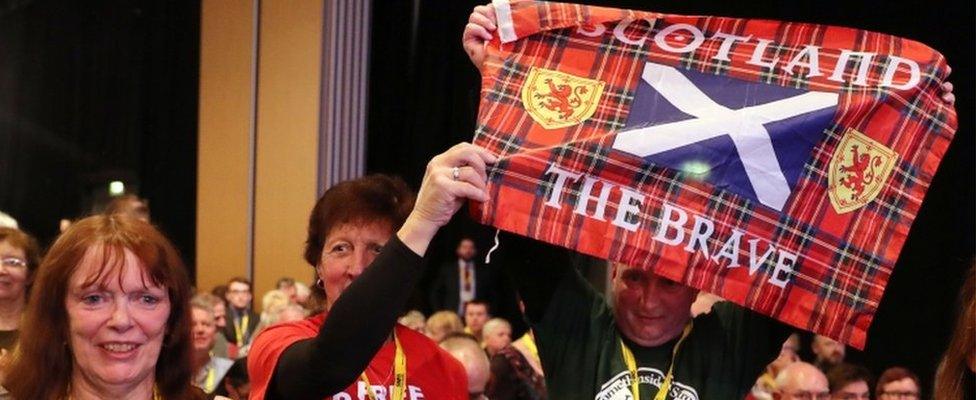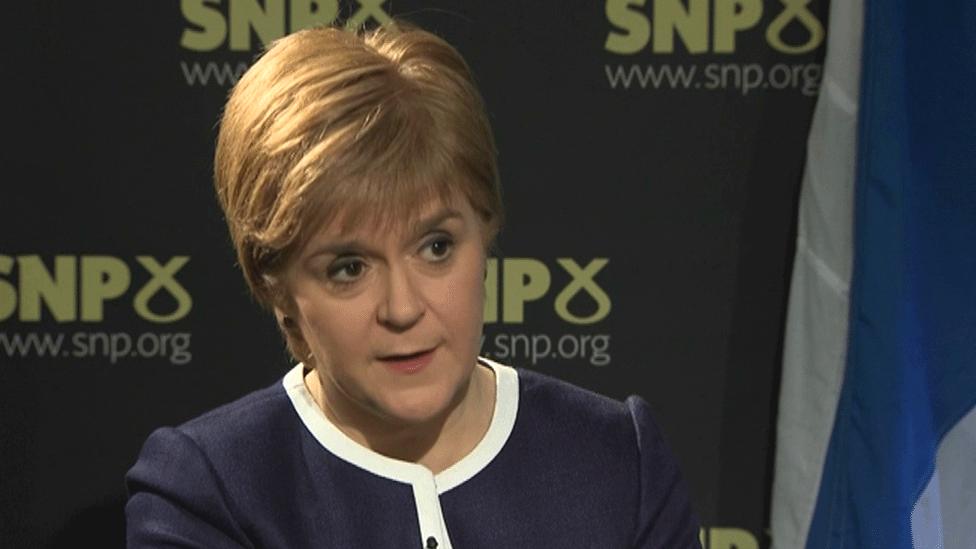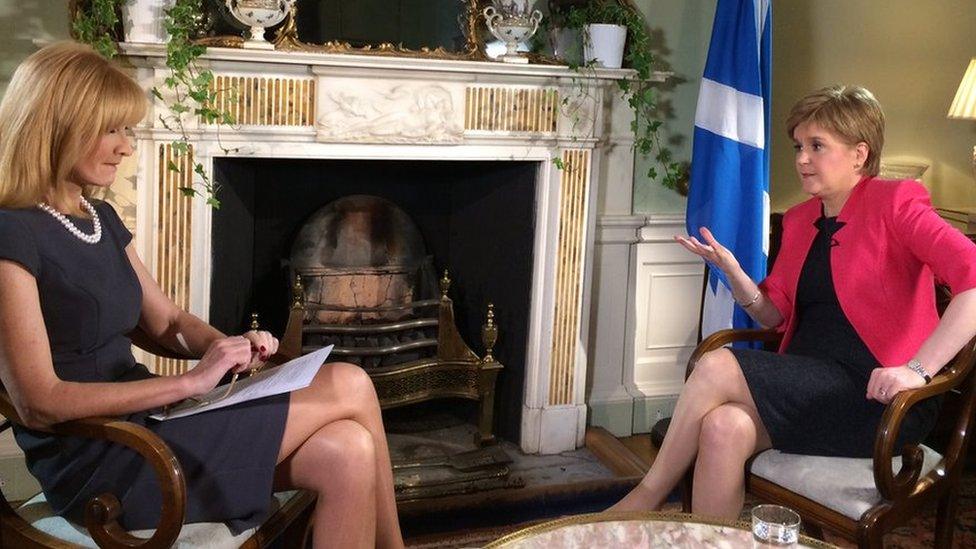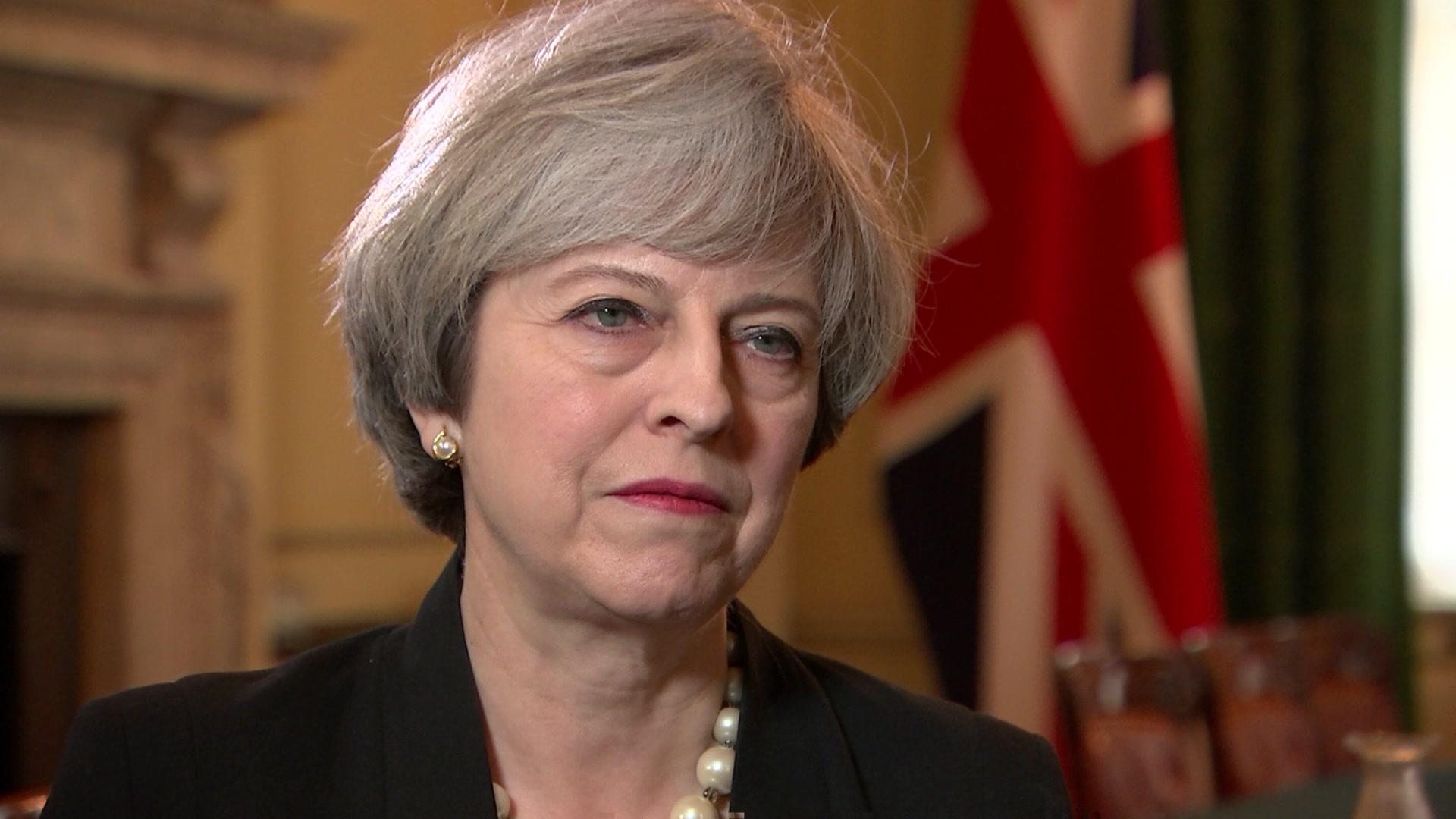Sturgeon: Holyrood's will 'must and will prevail'
- Published
Nicola Sturgeon: "Let the PM be in no doubt - the will of our parliament must and will prevail."
The SNP's Nicola Sturgeon has told her party conference that the will of Holyrood "must and will prevail" over a new independence referendum.
MSPs will debate calling for permission for a vote on Tuesday and Wednesday.
Theresa May said "now is not the time" for a second referendum and has indicated that the UK government would reject the SNP's preferred timetable.
Ms Sturgeon told delegates that refusing the call would "shatter" the idea of a partnership of equals.
A second referendum has become the focus of the conference after the UK government said it would reject Ms Sturgeon's call for a vote between Autumn 2018 and Spring 2019.
Mrs May argues that it would not be fair to hold a referendum before the state of the UK outside the EU becomes clear.
But the SNP leader told the party gathering that "Scotland's future must be Scotland's choice", citing an SNP manifesto pledge that there could be a new referendum if there was a "significant and material" change in circumstances.
'Time to think again'
She said: "Next week, in line with the mandate secured at last May's election, we will ask the Scottish Parliament to agree that the Scottish people should have the right to choose our own future.
"We will ask parliament to agree that this choice should be exercised at a time when we know the terms of Brexit but before it is too late to take a different path. And we will ask parliament's permission to seek the legal authority that will allow the people of Scotland to have that choice.
"If a majority in the Scottish Parliament endorses that position, the prime minister should be clear about this.
"At that point a fair, legal, agreed referendum - on a timescale that will allow the people of Scotland an informed choice - ceases to be just my proposal, or that of the SNP.
"It becomes the will of the democratically-elected parliament of Scotland."

Analysis
By BBC Scotland political editor Brian Taylor

Ms Sturgeon was addressing the SNP conference in Aberdeen
Brexit may be the trigger for the referendum, but it appears that it is not the first minister's focus with regard to the referendum. That reflects, of course, the fact that there is precious little sign of zeal for the EU, even in Remain-voting Scotland. There are many, indeed, who voted Yes in 2014 but Leave in 2016.
Rather, the First Minister focused upon what sort of country Scotland is and might become. To do so, she characterised the UK offer as driven by a hard Right, Brexiteer Tory administration - which she envisaged as enduring for a substantial period.
She was offering an "inclusive" Scotland in contradistinction to that depiction. In short, she was not suggesting that Scots might choose between membership of the UK and membership of the EU.
The choice would be between "progressive" Scotland and reactionary UK.

The Greens have said they will back the SNP in the vote, which follows a two-day debate, giving Ms Sturgeon a majority.
The first minister said that to "stand in defiance" of this would "shatter beyond repair any notion of the UK as a respectful partnership of equals".
She added: "She [Mrs May] has time to think again and I hope she does. If her concern is timing, then - within reason - I am happy to have that discussion.
"But she should be in no doubt. The will of our parliament must and will prevail."
Economic arguments
Ms Sturgeon said the case for independence should be made "with courtesy, understanding and respect".
And she said it was important to "embrace" scrutiny of the economic side of the argument, saying "it will be up to us to demonstrate how difficulties can be overcome".
She added: "As we debate our future, let's do so openly and honestly. But let no-one - for or against independence - ever seek to run down Scotland's strengths and our great potential.
"We should also be clear about this - those who argue for Scotland to stay in the UK have big economic questions to answer too. We know that down that path lies austerity, cuts and the impact of leaving the single market."
Gordon Brown: "If we leave the British single market then a more dramatic set of consequences follow."
Earlier on Saturday, former prime minister Gordon Brown set out a "third option" for Scotland's future, based on more powers being transferred to Holyrood after Brexit.
He told a gathering in Kirkcaldy, Fife, that a new form of federal home rule was needed to unite the country and avoid years of "bitter division".
Mr Brown explained: "The third option, a patriotic Scottish way and free from the absolutism of the SNP and the do-nothingism of the Tories, is now essential because post-Brexit realities make the status quo redundant and require us to break with the past."
He also said that if Scotland voted for an independence today the country would face greater consequences then it might have done in 2014.
Mr Brown said: "If we leave the British single market, which was not the proposal in 2014 of the Scottish National Party, then a more dramatic set of consequences follow."
- Published17 March 2017

- Published16 March 2017

- Published16 March 2017
